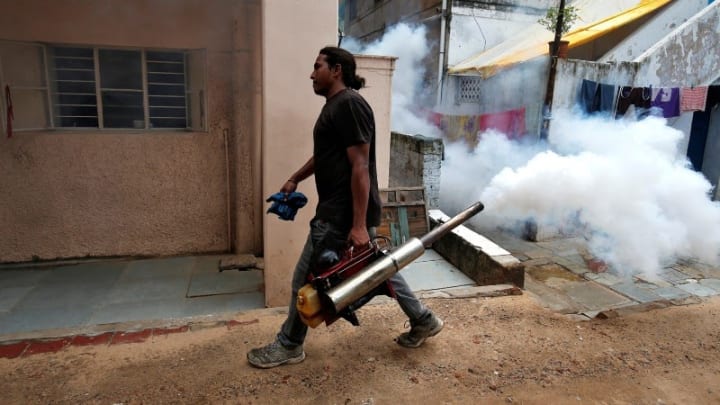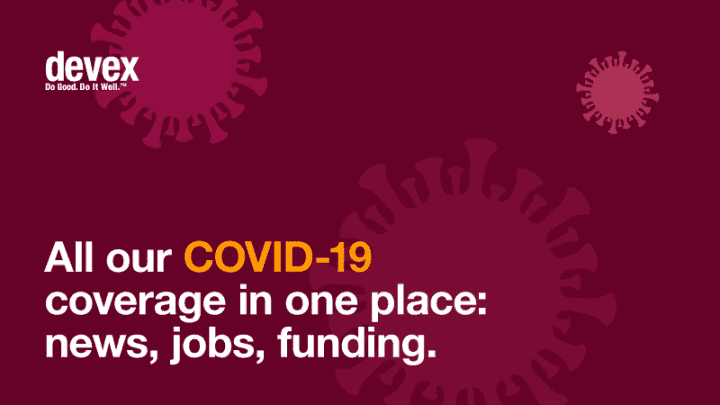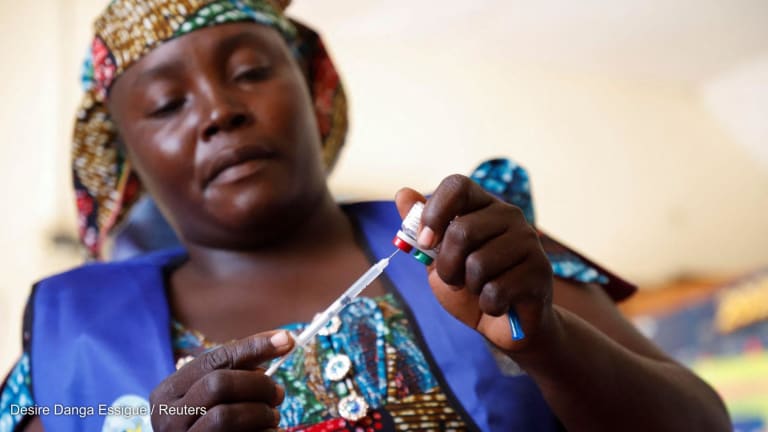
MANILA — Aid organizations working to curb the spread of malaria are exploring options to continue operations while protecting health care workers amid the threat of the novel coronavirus outbreak. This includes recommendations to relax some accountability mechanisms and pay sick health workers.
COVID-19 — a timeline of the coronavirus outbreak
Follow the latest developments on the new coronavirus that causes COVID-19.
In recent published guidance, the Alliance for Malaria Prevention said it was important to maintain vector control activities, such as distribution of insecticide-treated bed nets, or ITNs, in countries with active malaria transmission, while also maintaining the health and welfare of staff involved in these campaigns.
Activities that are difficult to implement and pose increased risk of COVID-19 infection should be stopped. Where activities do continue, the alliance said it might be important to accept reduced accountability procedures, like not requiring signature as evidence of ITN receipt.
Meanwhile, health workers that have shown symptoms of COVID-19 should stop working, but still receive compensation to keep them from not reporting their illness.
The alliance also said national programs should be prepared to respond quickly to any rumors, misunderstandings or disinformation — like false information that COVID-19 infections increase after using Chinese-produced ITNs — to ensure that malaria cases don’t increase due to unfounded fears of contracting COVID-19.
“It's essential that during this pandemic we continue protecting and saving those most vulnerable — pregnant women and children under 5 in malaria-affected countries — with life-saving malaria tools and prioritize safe delivery of these essential interventions,” a spokesperson for the RBM Partnership to End Malaria told Devex.
“We want to avoid the situation we saw during the Ebola crisis when in some countries more people died from malaria than Ebola,” the spokesperson said.
Preparing ahead of monsoon season
COVID-19 disruptions on health supply chains a challenge for aid orgs
Health organizations have enough stocks in place to continue with their programs — so far — but what happens in the long-term?
Measures to deliver essential antimalarial commodities and services are being considered ahead of the rainy season, when malaria transmission is highest. But this is already being complicated by lockdowns and travel bans, restricting movements of health workers and causing some supply chain disruptions.
“We have been alerted of potential shortages of medicines including malaria drugs. By the end of March, the Global Fund situation report notes that 10% of orders for HIV/AIDS, TB and malaria medicines face delays of more than 30 days,” said Dr. Marie Lamy, Asia Pacific Leaders Malaria Alliance director on access and policy.
In India, health workers and accredited social health activists, or ASHAs, who mostly work in rural and tribal areas, are also unable to move about because of the nationwide lockdown, said Dr. Sanjeev Gaikwad, country director of Malaria No More in India. The lockdown has been extended to May 2.
Jeffery Smith, chief operating officer at APLMA, told Devex there’s been anecdotal evidence from India that normal premonsoonal preparations, such as antimalarial prevention awareness campaigns and measures such as fogging, are not taking place because of the lockdown.
“The focus has shifted to COVID-19 and this is worrying as the region soon enters [the] monsoon season with an expected surge in malaria cases. These challenges are not only seen in India, but generally throughout Asia,” he said.
Gaikwad said long-lasting ITNs have already been distributed, and some antimalarial supplies have been prepositioned. Antimalarial activities can resume after the lockdown.
He said as long as this can happen before June 10, when monsoon rains usually begin, India’s “progress against malaria can still be kept in check.”
India is one of the countries with the highest burden of malaria, and accounts for close to half or 47% of malaria cases caused by the Plasmodium vivax parasite globally.
“The focus has shifted to COVID-19 and this is worrying as the region soon enters [the] monsoon season with an expected surge in malaria cases.”
— Jeffery Smith, chief operating officer at APLMAMeanwhile, Rob Mather, founder and CEO of the Against Malaria Foundation, told Devex there may be some delays in bed net distributions across the African continent, the extent of which is unclear.
“There are plans being developed across the malaria community in a number of countries to bring forward net distributions so [it’s] not a simple picture, as you may imagine. As an organization, we are looking at a variety of scenarios in our planning for the distributions with which we are involved so we can react quickly should adjustments be needed as a result of COVID-19,” he said.
The foundation hopes to provide more ITNs to households to help families sleep separately as a social distancing measure.
“Nets may also last for less time, if for example people increase the frequency and intensity of washing nets due to hygiene measures for COVID-19,” according to the foundation.
Rising interest in chloroquine
The COVID-19 pandemic has led to a surge of interest in certain drugs to treat the disease. This includes hydroxychloroquine and chloroquine, oral drugs known as treatment against malaria and other conditions, such as lupus.
These drugs are part of the World Health Organization’s “Solidarity trials,” and in 35 ongoing clinical trials, according to a recent study that reviewed a list of known online clinical trial registries. The U.S. Food and Drug Administration has also given emergency use authorization for these drugs’ usage for treatment or prevention of COVID-19.
There are concerns that surge demand for these drugs could lead to shortages and availability for those who need it, despite limited information of its effectiveness. In addition, the drugs have serious side effects, particularly for those with cardiovascular conditions. A Brazilian study trialing the drug chloroquine had to stop giving enrolled patients high dosage of the drug after several patients developed heart rhythm problems.
While it has yet to be proven safe and effective for COVID-19 treatment, governments have started placing large orders of these drugs. The Indian government has partially eased restrictions on export of hydroxychloroquine, subject to drug availability after domestic needs are fulfilled.
“If chloroquine is eventually proven safe and effective for treatment of COVID-19 there is fear that even with increased manufacturing there may not be enough to support malaria treatments when chloroquine is indicated. We will need to keep a close eye on this,” Smith said.
The American Society of Tropical Medicine and Hygiene said more data and evidence on the efficacy and safety of these drugs from robustly designed trials are needed.
“There is an urgent need for additional evidence from carefully designed, randomized treatment and prevention trials with new and old compounds to guide the use of any treatment regimen, especially for widespread use in COVID-19,” as per an ASTMH statement.
Any disruptions impacting malaria programs concerning these antimalarial drugs will likely be concentrated in Asia Pacific and Latin America, where the malaria-causing parasite Plasmodium vivax is mostly found and for which the drug is the recommended treatment.
APLMA has raised another concern however — an increase in substandard antimalarial treatments.
“There are shortages of commodities due to disruptions in production and supply chains. These disruptions can lead to patchy supply of quality-assured medicines which may open a door for poor-quality alternatives to infiltrate the supply chain. And it is the communities at the end of the road who are most at risk of accessing substandard or falsified medicines,” APLMA’s Smith said.
Visit our dedicated COVID-19 page for news, job opportunities, and funding insights.





